Mo
Moleschott, Jacob (1822-1893)
Dutch scientist, physiologist, philosopher, and teacher in Germany, Italy and Switzerland.
Molotov, Vyacheslav Mikhailovich (1890-1986)
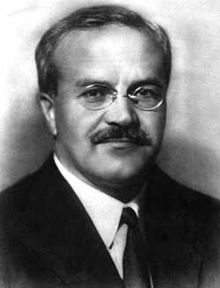 Joined R.S.D.L.P. in 1905 and a Bolshevik since 1909; met Lenin while in exile in London. Molotov escaped from prison in Siberia in 1915 and returned to Petrograd to become, with Alexander Shlyapnikov, one of the leading Bolsheviks in Petrograd. He was editor of Pravda in 1917 until Kamenev and Stalin attacked him for his ardent opposition to the Provisional Government, after which he was appointed a member of the Military Revolutionary Committee which organised the October Revolution.
Joined R.S.D.L.P. in 1905 and a Bolshevik since 1909; met Lenin while in exile in London. Molotov escaped from prison in Siberia in 1915 and returned to Petrograd to become, with Alexander Shlyapnikov, one of the leading Bolsheviks in Petrograd. He was editor of Pravda in 1917 until Kamenev and Stalin attacked him for his ardent opposition to the Provisional Government, after which he was appointed a member of the Military Revolutionary Committee which organised the October Revolution.
In 1920, he was elected to the Central Committee of the Communist Party, and by 1924 he became a member of the Politburo. Molotov became president of the Comintern from 1928-1934, president of the Council of People's Commissars, 1930-41, and foreign minister, 1939-49, 1953-56, in which capacity he was the signatory for the Pact with Hitler in 1939. In “honour” of his role in this deal, and the Soviet annexation of Eastern Poland and Finland that went with it, Finnish partisans gave his name to the “Molotov cocktail.” (e.g. the incendiary mix of Germans and Russians, oil and water) Molotov was a participant in the post-war negotiations with the Western powers. In 1957 Molotov was removed from his post in the Central Comittee, and became USSR ambassador to Mongolia due to his opposition to Khrushev's de-Stalinization program. From 1960-62 Molotov served as the ambassador to the International Atomic Enegry Commission, and after 45 years of government service, Molotov is expelled from the party. In 1984, after decades of effort, Molotov's party membership is re-instated. He died in Moscow on 8th November, 1986, one day after the 69th anniversary of the revolution. He was 96.
“I admire those people who went to the gallows for their ideas. A man could be told, ‘Just one word – give up and you'll start a good life.’ But a Bolshevik choose the gallows. He chooses the gallows!“
Molotov Remembers, ed. Felix Chuev, Jan. 16, 1973 conversation, p. 227
The Biographer Felix Chuev writes about Molotov's final years:
Molotov lived at the Zhukovka dacha from July 8, 1966, to June 27, 1986. Until the very last day he tried to do everything himself, Tatiana Afanasievna Tarasova, the housekeeper, told us. He was a very strongwilled person. Even when he was almost unable to walk, he tried to walk as far as the sixth post. You would say, stop at the fourth post, Viacheslav Mikhailovich!
No, not until the sixth!
Among the sheets of paper Molotov covered with crabbed writing during his last days, there is one on which he sketched out theses he had intended to work out:
"1. The fundamental principle of socialism (in contrast to communism) is fulfillment of norms of labor established by society. "2. The Communist party is the party of the working class (not of all the people). "3. Democracy under socialism."
He returned to these questions time after time during the years of our meetings. Apparently he would have liked to chat with the current leadership about problems of socialism, and he said something of the kind to his housekeeper:
"Phone Smirtiukov, the administrative director of the Council of Ministers. Ask him if Gorbachev could find the time to speak with me.
Nothing came of it.
His mind worked as in former years. It was only at the very end that a decline became noticeable. Shortly before his death, he read the last page of Pravda, laid down the paper, and said, "Invite Shevardnadze to see me at 5 p.m." Apparently Molotov was agitated over some international problem, and he reverted to his former role as a member of the Politburo, first deputy chairman of the Council of Ministers, and minister of foreign affairs. Members of his household thought he would forget all about it by 5pm but by that time he had put on his suit and necktie. They told him that Comrade Shevardnadze was busy and could not accept...
He survived eleven heads of the country. He was born under Alexander III and died under Gorbachev.
At his funeral I had said, 'We bid farewell today to a fighter for communism, to Lenin's last surviving comrade-in-arms.'
Molotov Remembers, ed. Felix Chuev, p. 418-19
See Molotov Archive.
Moltke, Helmuth Karl Bernhard (1800-1891)
Prussian general and Field-Marshall. Wrote as an ideologist of Prussian militarism.
Momoro, Antoine (1756-1794)
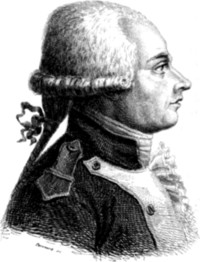 “First printer of Liberty” of the period of the French Revolution. Member of the radical Cordelier Club and the printer of Jacques Hébert’s newspaper “Le Père Duchesne.” A lifelong opponent of royalty and religion, he was secretary of the Cordelier Club, a revolutionary society to the left of the Jacobins. Arrested for his part in the demonstration that led to the massacre on the Champ de Mars in July 1791, he was increasingly involved in the most radical aspects of the Revolution, notably the dechristianization campaign. In 1793 his wife Sophie played the role of the goddess of Reason at the Fête de la Liberté et la Raison. Elected to the Directorate of the department of Paris, he was the first person to have the words Liberté, Egalité, Fraternité inscribed across the front of government offices. Momoro was sent to the Vendée to ensure the supplying of the army fighting the royalist uprising in the region. Arrested and executed in March 1794 along with the rest of the Hébertists, his shouted at those judging him: “They accuse me who gave everything for the revolution.”
“First printer of Liberty” of the period of the French Revolution. Member of the radical Cordelier Club and the printer of Jacques Hébert’s newspaper “Le Père Duchesne.” A lifelong opponent of royalty and religion, he was secretary of the Cordelier Club, a revolutionary society to the left of the Jacobins. Arrested for his part in the demonstration that led to the massacre on the Champ de Mars in July 1791, he was increasingly involved in the most radical aspects of the Revolution, notably the dechristianization campaign. In 1793 his wife Sophie played the role of the goddess of Reason at the Fête de la Liberté et la Raison. Elected to the Directorate of the department of Paris, he was the first person to have the words Liberté, Egalité, Fraternité inscribed across the front of government offices. Momoro was sent to the Vendée to ensure the supplying of the army fighting the royalist uprising in the region. Arrested and executed in March 1794 along with the rest of the Hébertists, his shouted at those judging him: “They accuse me who gave everything for the revolution.”
Monmousseau, Gustav (1883-1960)
Former revolutionary syndicalist, became a leader of the French CP and the CGTU, and a staunch Stalinist.
Monatte, Pierre (1881-1960)
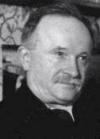 A proofreader by profession, he entered politics as an anarchist and later founded the revolutionary syndicalist revue La Vie Ouvrière. He was a Zimmerwaldian internationalist during World War I.
A proofreader by profession, he entered politics as an anarchist and later founded the revolutionary syndicalist revue La Vie Ouvrière. He was a Zimmerwaldian internationalist during World War I.
An editor at l'Humanité, after October 1917 he joined the PCF and was expelled in 1924 for his opposition to Stalinism. He then returned to revolutionary syndicalism, and in January 1925 he founded La Révolution Prolétarienne. In 1930 Monatte was a member of the Committee of 22 for Labor Union Unity. This initiative caused a break with Trotsky.
Monnet, Georges (1898-)
French minister of agriculture in Leon Blum's first and second cabinet, 1936-1938.
Monod, Jacques (1910-1976)
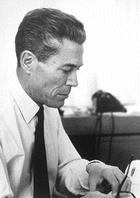 French biologist who received a Nobel Prize in 1965 for his work on the synthesis of proteins and was a Marxist whose Epistemology and Marxism drew attention to the interconnection between social practice and knowledge and examined social and ethical problems arising from the advanced developments of science, particularly genetics.
French biologist who received a Nobel Prize in 1965 for his work on the synthesis of proteins and was a Marxist whose Epistemology and Marxism drew attention to the interconnection between social practice and knowledge and examined social and ethical problems arising from the advanced developments of science, particularly genetics.
His 1971 Chance and Necessity achieved best-seller status, exploring the way in which natural laws rested on chance, popularising the newly uncovered structure of the DNA molecule the way in which the most complex forms of life are founded in the very simple coding mechanism of the DNA molecule.
Morin, Edgar (1921 – )
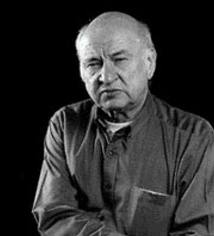 Of Sephardic Jewish origin (he was born Edgar Nahoum and assumed the name Morin while in the Resistance) Morin has been an almost frighteningly prolific writer (he published four books in 2011 alone, the year he turned 90) on subjects as varied as the cinema, the Soviet Union, anti-Semitism and the Jewish question, sport, his own life, and sociological method. He was also the founding editor of the important journal of ideas “Arguments.” Expelled from the French Communist Party in 1949, he has been an important figure on the independent left ever since.
Of Sephardic Jewish origin (he was born Edgar Nahoum and assumed the name Morin while in the Resistance) Morin has been an almost frighteningly prolific writer (he published four books in 2011 alone, the year he turned 90) on subjects as varied as the cinema, the Soviet Union, anti-Semitism and the Jewish question, sport, his own life, and sociological method. He was also the founding editor of the important journal of ideas “Arguments.” Expelled from the French Communist Party in 1949, he has been an important figure on the independent left ever since.
See Edgar Morin Archive.
Moonesinghe, Anil Kumar (1927-2002)
Born Colombo, son of Piyadas Moonesinghe, a nephew of the illustrious Rev. Anagarika Dharmapala [Don David Hewawitharana], the revered leader of the Sinhalese Buddhist rennaisance. Educated Royal College and University College, Colombo. Identified with the Lanka Sama Samaja Party-Bolshevik Leninist Party of India during the war. Entered University of London to study law, 1945. Met and later married Jeanne Hoban, a member of the Communist Party and converted her to Trotskyism. Joined Revolutionary Communist Party, the British section of the FI. Member, Labour Party, 1945-52. Returned to Ceylon and joined Lanka Sama Samaja Party, 1952. Vice President, Lanka Estate Workers Union. Member of Parliament (Agalawatte constituency), 1956-67. Minister of Communications (Transport), LSSP-SLFP-CP coalition government, 1964-65. President, United Motor Workers Union. General Secretary, United Corporations and Mercantile Union. Chairman and General Manager, Ceylon Transport Board, 1970-75. Deputy Secretary, Lanka Sama Samaja Party, 1978. Left LSSP, 1982; formed rival Sri Lanka Sama Samaja Party. Joined SLFP, 1983. Member of Parliament (Matugama), 1983-89, and (Kalutara), 1989-2000. Appointed Deputy Speaker of Parliament, 1994. President, Mahabodhi Society of Sri Lanka, a Buddhist organisation. Ambassador to the UN (Austria), the former Yugoslav republics, Hungary, the Czech Republic, and Slovakia, 2000-2001. Author: Chekoslovækiyava (1968) and Polanthaya – 1980 (1980).
Compiled by Charles Wesley Ervin
Montesquieu, Charles de Secondat, Baron de (1689-1755)
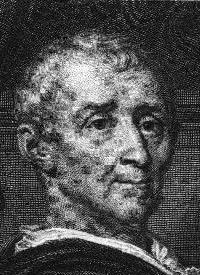 French political thinker of the Enlightenment who articulated the theory of separation of powers.
French political thinker of the Enlightenment who articulated the theory of separation of powers.
Born in 1689 at Chateau La Brede near Bordeaux, he was president of the “parlement” of Bordeaux by the age of twenty-seven, and shortly afterwards achieved literary success with the publication of his Lettres persanes (1721), a satire based on the imaginary correspondence of an Oriental visitor to Paris, pointing out the absurdities of contemporary society. He travelled widely, spending two years in England (1729-31), but was troubled by poor eyesight, and was completely blind by the time of his death in 1755.
His great work, De l'esprit des lois was published anonymously in 1748 and was enormously influential. He argued that the aristocracy protected the state from the absolutist despot (or monarchy) and from the despotism of the many. His was a purely political and rational defense, not economic. Montesquieu's motto was, Freedom-Liberty is the step-child of privilege. This allowed Montesquieu to defend the constitutional monarch as he claimed it was governed by honor. Montesquieu argued that the monarchs could become too passionate and the commons were too big and too egalitarian to rule properly. However, he portrayed the aristocracy as having and maintaining the honor that kept monarchies constitutional. But, he also warned that the aristocracy is doomed when it becomes self-interested, arrogant and parasitic.
Montesquieu's most radical work situated the three French classes into a “checks and balances” – a termed he coined – of three sovereignties: the monarchy, the aristocracy and the commons. Montesquieu saw two types of powers existing: the sovereign and the administrative. The administrative powers were the legislative, the executive, and the judiciary. These powers were to be divided up amongst the three classes so that each would have a power over the other. This is so radical because it completely eliminates the clergy from the estates and because it erases any last vestige of a feudalistic structure.
See The Spirit of Laws.
Moore, Samuel (1830-1895)
British jurist. Judge in Manchester, legal adviser of Marx and Engels (being their close personal friend). Member of the International. Translated the Communist Manifesto into English (1888 translation). Also translated, jointly with Edward Aveling, volume one of Capital.
Morgan, Henry (1818-1881)
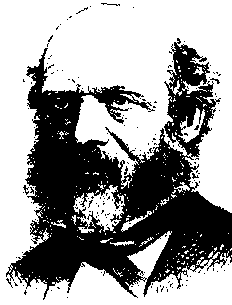 American scholar, ethnographer, archeologist and historian of primitive society. Author of the book Ancient Society, published in London in 1877, which was the inspiration for Engels' The Origins of the Family, which appeared seven years later.
American scholar, ethnographer, archeologist and historian of primitive society. Author of the book Ancient Society, published in London in 1877, which was the inspiration for Engels' The Origins of the Family, which appeared seven years later.
More, Thomas (1478-1535)
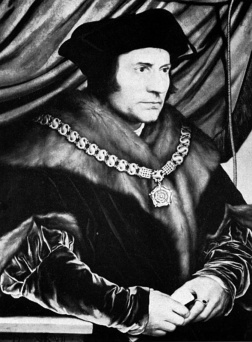 More was a very important politician and intellectual of his time, at the
peak of his career being Lord Chancellor of England under Henry VIII. He was
a famous opponent of Protestantism, and wrote a number of extremely
polemical works on the matter, finally being banned from publishing by the
government. He was eventually consigned to the Tower of London for his
dogged defence of Catholicism, and then beheaded after being tried for
treason. For this he was canonised in 1935 by Pope Pius XI.
More was a very important politician and intellectual of his time, at the
peak of his career being Lord Chancellor of England under Henry VIII. He was
a famous opponent of Protestantism, and wrote a number of extremely
polemical works on the matter, finally being banned from publishing by the
government. He was eventually consigned to the Tower of London for his
dogged defence of Catholicism, and then beheaded after being tried for
treason. For this he was canonised in 1935 by Pope Pius XI.
While for some More is inevitably remembered for his services to Catholicism, his “Utopia” is completely unconcerned with Catholic issues, and it is in bequeathing this word to the English language that he has had the greatest influence. Although obviously founded from an ancient Greek etymology, the term “utopia” as we use it actually originates in Thomas More’s 1515 book of that name, and More’s book still provides us with a complex meditation on issues and questions that remain prescient, such as “What is a utopia?” “Is a utopia a mere fantasy, a guiding ideal, or something else?” “Can the utopian be more than an ideal?”
In our usage of this word it is often forgotten that many of these complex issues had already been played upon by More, and the word is even thrown around as a simple pejorative (see e.g. Engels’ “Socialism: Utopian and Scientific”). “Utopia” has come to signify the romance of an ideal unrelated to reality, and thus increasingly seems to signify something tragic or simply pathetic; an unfulfilled or unfulfillable dream.
More, however, was already well aware of these possible aspects to the utopian. The title of the book, for example, is famously a self-undermining joke: u-topia means “non-place” or “nowhere”. In fact, More revels in such tricks, and has the description of the island of Utopia narrated by a “Raphael Hythloday”, whose name roughly translates as “talker of nonsense”. It is hard to fathom the extent to which such tropes are merely More’s mischievous sense of humour, and the extent to which they are a political safeguard for a book which could have got him into trouble. Since the first half of the book contains a sustained social criticism of the England of his day, and the second proposes an alternative, it is impossible not to reason that there is a great deal more at stake than More’s sense of humour; but is all this irony simply political self-defence? We can at least say that he does not merely mean to argue that “utopias” are by definition vacuous ideas that are unworthy of attention.
The addenda to “Utopia” are commonly forgotten, but in many senses they are the key to the rest of the book. These, presented as an assemblage of documentary fragments, tell us of a place that is on the fringes of real knowledge- an alphabet is known, but not included here; maps do not exist, but one missing sailor knows the way, and so on. Most importantly, More renders the apparent joke of his title distinctly ambivalent, as he tells us in verse that the island is not correctly the “nowhere place” of u-topia, but the “good place” of eu-topia. His self-undermining joke is thus itself in a sense placed “under erasure”, and the island is reasserted as a good place. Furthermore, he compares his Utopia to Plato’s Republic, and in doing so plays upon a tension between the ideal and the real:
“I one of all other without philosophy
Have shaped for man a philosophical city.”
and,
“For what Plato’s pen hath platted briefly
In naked words as in a glass,
The same have I performed fully.”
With his many references to philosophical ideals, poetry and language, as he completes his book, it would seem that More is partly alluding to how utopias may be constructions of language, and that his is necessarily prior to completion – for the Utopian alphabet itself is missing. Yet we should not over-emphasise the latter poetic aspects of the book; rather, Utopia is a construction of two complementary halves, and the first of these is a piece of social criticism. More, in fact, seems to have consciously divided Utopia between real (the First Book) and ideal (the Second Book), and the whole can be read as a play on the tension between these two, which is underlined by his play on the names “Utopia” and “Eutopia”. Perhaps it is that More’s work shows us that social criticism must work between these two poles; that it takes its authority not only from the positively real, but also from the impossibly idealistic.
As the narrator says, speaking More’s thoughts at the conclusion to Book Two: there is much to wish for in Utopia, though there may be doubt about such things ever coming to be. It is, however, certain that More wished that the Utopian were not only “nowhere”, but that the Eutopian (the good place) might actually come about.
See Utopia.
Rob Lucas
More, Prabhakar (1934-2008)
Joined radical student movement in Bombay while still a teenager. Came in contact with Bolshevik Leninist Party of India in 1948. Joined SP with BLPI. Elected to Bombay Municipal Corporation. Delegate to SP Convention, 1950. Worked as Socialist trade unionist in Mumbai Girni Kamgar Union and the India United Mills. Remained with SP (Loyalists), 1952. Joined Socialist Party (Lohia). Associated with the railway union leader, George Fernandes. Became leader of Hind Mazdoor Kisan Panchayat. Interviewed: Meena Menon and Neera Adarkar, One Hundred Years, One Hundred Voices: The Millworkers of Girangaon, An Oral History (2004).
Compiled by Charles Wesley Ervin
Morelly, Étienne-Gabriel (1717-1778)
Utopian communist.
Little is known of Morelly. He was a tutor and lived in the town of Vitry-le-François, in north-western France. His first name, the dates of his birth and death, where he was born, and other biographical details, are not known. All that is known is that he was the author of several philosophical works as well as an epic poem, Basiliad, which told of a communist utopia in a faraway land.
This work was sharply criticised, and Morelly wrote Code of Nature in 1755 in an attempt to provide a systematic philosophical justification of his communist ideas.
Morrow, Felix (1906-1988)
Felix Morrow was for many years a leading figure figure in American Trotskyism, best known for his classic Revolution and Counter-Revolution In Spain. He joined the Communist League of America in 1933 and after Max Shachtman’s minority split in 1940, served as editor of the Socialist Workers Party’s paper, the Militant, and its theoretical journal, Fourth International. He was one of 18 SWP leaders imprisoned under the Smith Act during the Second World War. In 1943 he formed a faction, with Albert Goldman which challenged the SWP’s ‘orthodox’ catastrophic perspective. In one of the most instructive factional struggles in the history of the Trotskyisi movement. Morrow and Goldman projected the likelihood of a prolonged period of bourgeois democracy in western Europe and emphasised the need for democratic and transitional demands against the maximalism advocated by the majority. Although he was expelled from the SWP in 1946 for ‘unauthorised collaboration’ with Shachtman’s Workers Party, he did not join Shachtman, and drifted out of politics to the right. He subsequently worked on both Fortune magazine and Reader’s Digest.